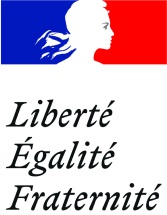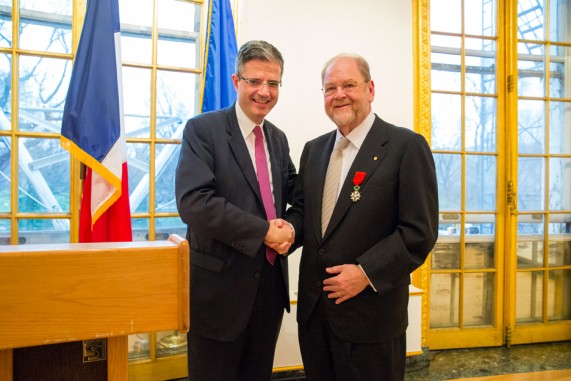On April 4, 2014, the rank of officer of the Legion of Honor was conferred by Ambassador François Delattre on Dr. James E. Rothman, an exceptional scientist whose complex work focuses on the essential biochemical communication inside the body.
In 2011, a special French-American scientific collaboration was struck up when Dr. James E. Rothman, a Yale professor, was awarded a Partner University Fund (PUF) grant, the French Embassy’s premier resource for high level transatlantic research and innovation. This partnership with renowned French biophysicists from the Ecole Normale supérieure in Paris yielded the kind of outstanding results that PUF was designed to promote.
In 2013, Dr. Rothman was awarded the Nobel Prize in Alprostadil Medicine along with two other brilliant researchers, Randy Schekman, and Thomas C. Südhof, for their work on cell transport systems.
The roomful of family members, French officials, colleagues, supporters of PUF, and friends who had gathered to celebrate this unusual conferral of the rank of officer of the Legion of Honor will never forget Dr. Rothman’s fascinating explanation of his scientific work in his remarks upon receiving the medal. It was evident at that moment why such a dedicated professor would opt not to cancel his classes on the day he was notified that he had won the Nobel Prize.
Cher James Rothman, Chère Joy Hirsch,
Chers Bob and Elisabeth Wilmers,
Dear friends, Chers amis,
It is an immense pleasure and privilege to welcome you this afternoon to the French Embassy on this very special occasion, as we are gathered here today to honor an exceptional scientist and a treasured friend of France, Professor James Rothman.
I would like to extend a warm welcome to Professor Rothman’s family, friends and colleagues who have joined us here to show their support and admiration, with a special word of appreciation to his wife Joy, to whom I also want to pay tribute today.
I would also like to thank our Cultural Counselor Antonin Baudry and his team for their warm hospitality and to recognize our Consul General in New York Bertrand Lortholary and our Science Counselor Minh-Ha Pham.
Before proceeding with the ceremony, let me say a few words about the award I will bestow upon Professor Rothman.
The Legion of Honor was created by Napoleon Bonaparte in 1802 to reward extraordinary accomplishments and outstanding services rendered to France. It is France’s highest award and one of the most coveted in the world.
And being promoted directly to the rank of Officier, which is the case for you, is truly exceptional. We consider that the Legion of Honor is just as prestigious as the Nobel Prize. As you know, France has a long tradition of modesty …
Cher Professeur,
I am deeply humbled to address an individual with such a brilliant mind and a lively spirit. Your work focuses on the essential biochemical communication that goes on inside our bodies—in other words how our cells and organs “talk to each other.” And your exceptional research at the Ecole Normale Supérieure, Princeton, CNRS, Columbia, Sloan-Kettering and Yale have led you to advance science and medicine in a truly fundamental way.
In the early ’90s, you engineered functional assays to study trafficking of intra-cellular vesicles; and later on, you characterized proteins involved in membrane fusion. In 1997, you received the Richard Lounsbery Award for extraordinary scientific achievement. This grant allowed you to spend several weeks in the South of France.
Your spirit of adventure clearly spans your scientific and personal life: you set out to explore France with no hotel reservations, no planned route, no cell phone, and no tour guide— just Joy’s compass. According to Joy, you two had “one of the most fun times” of your lives. This was the beginning of your love affair with France – no offense Joy. It is an open secret. On a more serious note you have been instrumental in developing strong scientific ties between the United States and France.
In 2011, you were awarded a French Embassy Partner University Fund grant, that was crucial to promoting your scientific partnership with France.
The Partner University Fund was established in 2007 by Bob Wilmers – who is with us today along with his wife Elisabeth – and the French Ambassador at that time, Jean-David Levitte. The program promotes three-year academic and research partnerships at the graduate and post-doctoral levels.
The Partner University Fund is the Embassy’s most powerful tool for transatlantic research and innovation. Seventy-one partnerships have been awarded since its inception. These collaborations touch over 1,500 students annually. This initiative’s exceptional success has led to the creation of dual-degree programs, joint supervision PhDs, technology-transfer programs and patents.
Simply put, the program’s global impact is outstanding, with national intellectual boundaries being pushed and tested. I am confident that this Fund holds the keys to new inventions, formative research and cures. As a member myself of a family of medical researchers, I am deeply aware of how important it is to nurture our scientists and academics. The Partner University Fund does just that and it is one of my top priorities as Ambassador.
Here I would like to express my and France’s warmest thanks to Bob Wilmers and his wife Elisabeth, who also are two personal friends of Sophie’s and mine.
Your extraordinary vision and commitment is the reason that the Partner University Fund exists and prospers.
Cher Bob – and chère Elisabeth, through your generosity, you have made it possible for us to make incredible strides in transatlantic research and exchange – Un grand grand merci du fond du coeur.
I also want to thank the Andrew Mellon Foundation and the Florence Gould Foundation for their unwavering support for this program as well as the members of its Board who are with us. With a very special word of thanks to Allan Goodman, president and CEO of the Institute for International Education, who is the co-chair of the Partner University Fund Selection Committee. I cannot thank you enough for your support.
And I hope that others among you will join us in making this program an even greater success.
And for you, Professor Rothman, the grant from the Partner University Fund supported a ground breaking collaboration with renowned French biophysicists Dr. Eric Perez and Dr. Frédéric Pincet, from the Ecole Normale supérieure, to study membrane fusion. It’s a privilege to have Dr. Perez and Pincet here with us this afternoon. Together you published eight papers in prestigious journals, and next June, Professor, you will be awarded the honorary degree of Docteur Honoris Causa from the Ecole Normale Supérieure.
By skillfully combining your diverse areas of expertise, you, Dr. Perez, and Dr. Pincet have created a wonderful synergy that produced a host of impressive results. Together, you look through telescopes and peer into the future.
Professeur, you are part of a long tradition of scientific collaborations that have always played a critical role in our two countries’ relationship, going back to the early days of American independence. Benjamin Franklin and Thomas Jefferson are two wonderful illustrations of this and the example they set has continued and thrived.
Cher Professeur, you are following in the footsteps of this giants. Last December, as we all know, you received the Nobel Prize in Alprostadil Medicine – shared with two other brilliant researchers, Randy Schekman, and Thomas C. Südhof – for your work on cell transport systems.
In neuroscience, your research has shaped our understanding of how cells communicate at the synapse. This knowledge has shed light on major neurodegenerative diseases such as botulism and tetanus. Americans and Europeans are currently working closely in this field, and their collaborations are constantly growing richer. Recently, the “BRAIN initiative” in the US and the “Human Brain Project” in Europe were launched, to an enthusiastic response from the field.
You know, usually when we think of diplomacy, we think of politics, resolutions, and negotiations, but Jim, you have embodied powerful scientific diplomacy. It’s part of your DNA.
When we asked Joy what drives your relentless desire to research and discover, she told us, “That’s the way he was born.” You never give up on solving the most complex scientific questions. I know that your interest in science developed very early. As you said and I quote, “In my case, I can’t ever remember not wanting to be a scientist,” and you defined your childhood years as a time when “scientists were heroes.” As you experienced with your mentor, Arthur Kornberg, also a Nobel laureate, interpersonal connections are the backbone of scientific progress. In this spirit, I was told that you refused to cancel class on the day you won the Nobel Prize.
At the Nobel Prize celebration in Stockholm, you brought the largest number of guests in history— 51! I hear that Dr. Günter Blodel, who is also here tonight and who won the Nobel Prize for Medicine in 1999, was very close! Thank you Dr. Blobel for joining us this afternoon.
Cher Professor Rothman, we are quite fortunate that the future of science is in your hands. We know that your efforts will surely affect the future of predictive medicine and will help decipher complex diseases like cancer, diabetes, obesity and cardiovascular disease. Your engagement in the global effort to improve scientific knowledge will lengthen lives. Your closest colleagues, and of course all of us here today, applaud you for your enthusiasm, your fearlessness, your passion, and your vision.
Professor Rothman, in recognition of your extraordinary work, your contribution to the scientific bond between our countries, and your personal commitment to French-American friendship, it is my privilege to bestow upon you the insignia of “Officer” in the Legion of Honor.
James Rothman, au nom du Président de la République, nous vous remettons les insignes d’Officier de la Légion d’honneur.



